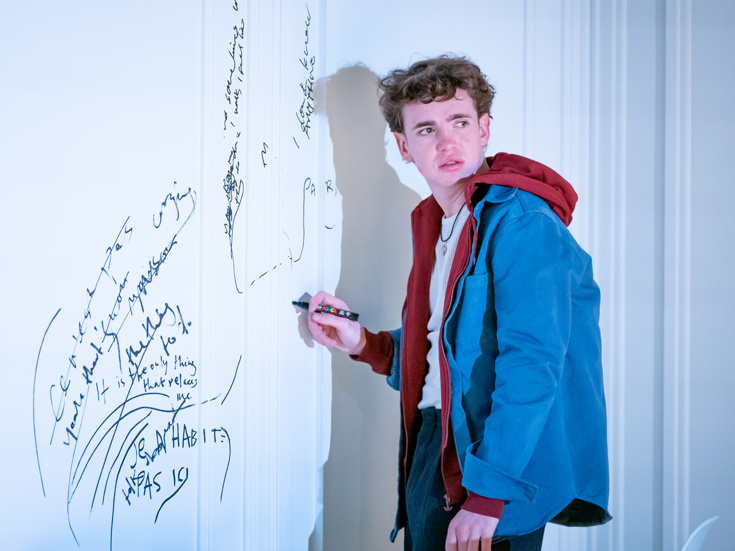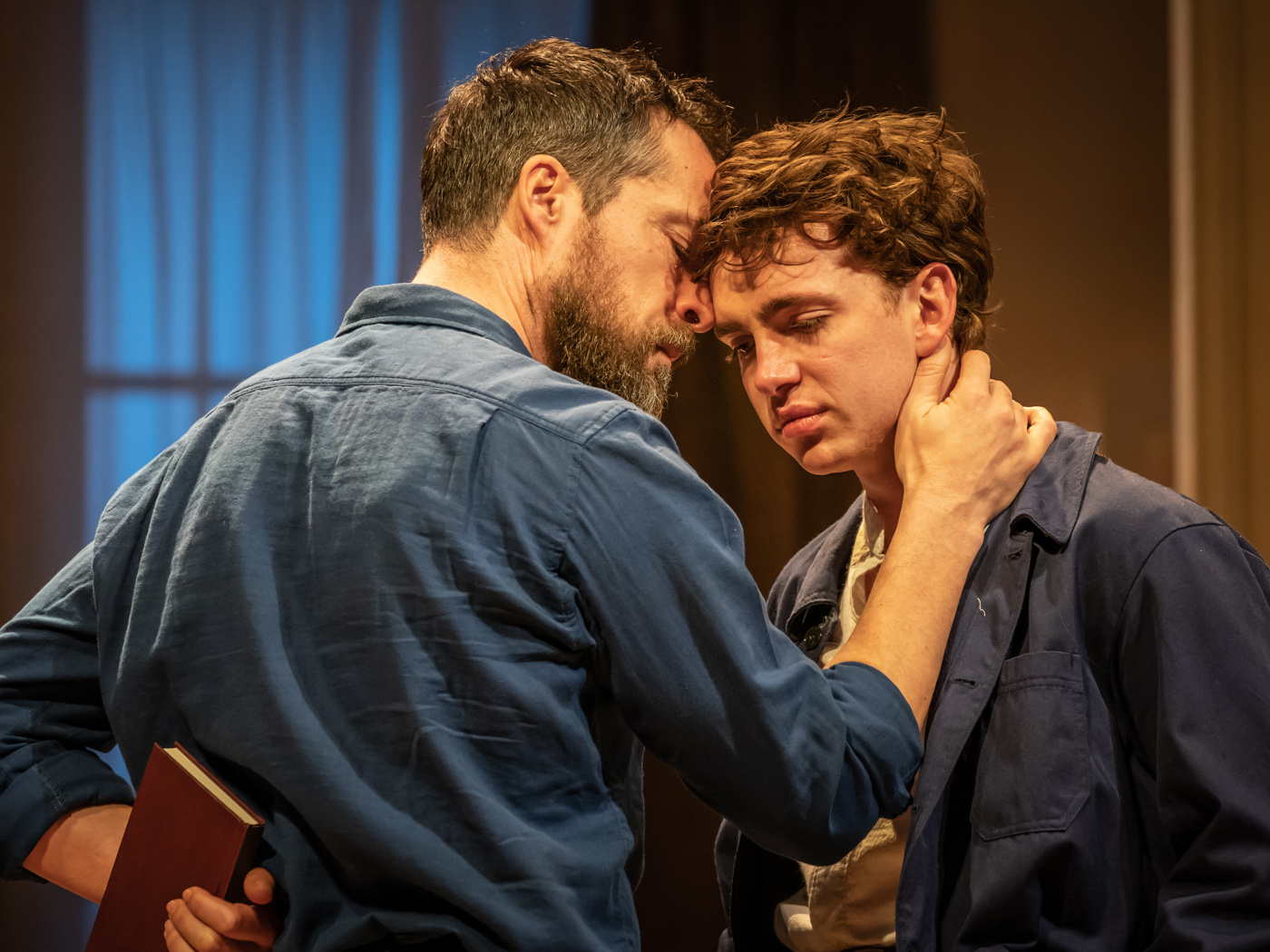Laurie Kynaston on Going Through a Tough Adolescence in Florian Zeller's The Son in the West End

(Photo: Marc Brenner)
The French writer Florian Zeller is rarely long absent from the London or New York stage. On Broadway he is represented at the moment by the transfer from the West End of The Height of the Storm and Zeller has a current West End show, The Son, that has transferred to the Duke of York’s Theatre following a successful run at north London’s Kiln playhouse. The production has garnered raves for Laurie Kynaston in the title role of the depressive Nicolas, the teenage son of divorced parents. The character's fraught emotional state clearly isn’t shared by the buoyant and communicative actor, to whom Broadway.com spoke one recent afternoon.
Is this a difficult role to live with, given the intensity of the character and the play as a whole?
It is, yes, but at the same time there’s a lot of lightness to Nicolas. I kind of want to get this across, so that people don’t get the idea that the play is this gloomy, terrifying, sad ordeal. It’s about family relationships and people trying to figure out what to do and everyone trying to do their best and make space for one another.
In other words, it’s not just a clinical case study of a mind under siege?
I really think [The Son] is not just this play about depression. There’s lots in there for people to relate to. It certainly puts things in your own life in perspective and that has been really brilliant!
Is the play difficult to put to one side after a performance, or maybe you find it cathartic?
It is cathartic in some ways in that everyone has their own way of getting to these places, but not in a massive therapy way. But there’s something cathartic about figuring out things that have happened to you and assimilating them to this character.
But you don’t take Nicolas’s mental state home with you?
I feel as though as I kind of get it all out of my system by the time the play finishes, so it’s quite easy in some ways to leave it behind. The play takes a while for John [Light, his co-star] and me to come down from, but that’s just because of the adrenalin rush of being onstage pretty much all the time. It’s not until about 2 a.m. that I start to come down from the adrenalin rush.
Are you ever inclined to bow in character, as if to show the audience that you’ve undergone quite a journey?
You know, I don’t really subscribe to that somber thing where the actors kind of nod at the audience about how tough it’s all been. I think [during the curtain call] that it’s really important to let the audience know you’re OK. I’ve always wanted to do a show at Shakespeare’s Globe, where you get to do that jig at the end that is so full of fun and passion. “Joy” is my favorite word.
How does it feel, as a 25-year-old yourself, to inhabit the mental state of someone who is 17?
It’s definitely a relatable issue. No matter where we come from, we’ve all been through that tricky time in our lives where your hormones are spiraling out of control and you’re just trying to navigate your way through. Teenage years are so hard that I can’t believe we all did it; I can’t believe I got through it!
Given that your photo is very much part of the marketing campaign for the play, how does it feel to see your face all over the place, including on the tube?
It’s pretty weird but also pretty cool to be in all the tube stops. I’m tempted to kind of linger next to the poster pointing at myself. I keep waiting for people to say, “Hey, I’m just wondering if you’ve seen this show,” and I can say to them “I’m actually in the show!” [Laughs.]

The Son (Photo: Marc Brenner)
This actually isn’t your West End debut, is it?
No, I was in the replacement cast of The Ferryman, at the Gielgud Theatre. Rosalie Craig played my mum. Being in that was one of the highlights of my life, never mind my career: it felt like such a brilliant thing to be part of.
How do you think Nicolas might cope if he landed in the large and clamorous northern Irish family on view in The Ferryman?
Oisin Carney [his Ferryman character] is also trying to figure out his way in the world of that play, so there are quite a lot of parallels between the two [characters]. But maybe if Nicolas were in The Ferryman, there would be 20 family members to bring him out of himself, whereas in The Son he’s for all intents and purposes an only child with no one to speak to. There’s no one around to whom he can say, “I feel weird.”
How does your own family dynamic stack up against these various plays?
I’m the youngest of four boys: they’re all musicians and my mum plays the cello, so it was a very musical house growing up. I grew up in north Wales in the middle of nowhere, and my family life wasn’t remotely like that in the play. But at the same time, we all recognize the world Florian puts on stage and know those dynamics.
Speaking of the divine Rosalie Craig, late of Company, would you like to do a musical?
I’d love to for the feel of it: musicals are so impressive! But I can’t do what those guys and dolls do, if you’ll excuse the pun. I’d quite like to do something that felt like a play with songs—Girl From the North Country, or something like that, where I didn’t feel as if I was in a traditional musical.
Did it feel unusual either then or now that you didn’t attend drama school?
Not really: things are changing that way and the snobbery [surrounding drama school] is a lot less. Also, the cost of drama school is so enormous: you might be a 21-year-old coming out with a £30,000 debt!
How was it working with recent Broadway musical alum Beanie Feldstein (from Hello, Dolly!) in the new film How to Build a Girl?
We got on so well and she’s just one of my really good mates: whenever we’re in London, we see one another and it’s as if we had always known each other. She is just full of joy and kindness and talent—everything you would expect and more.
Did working with her plant the seed in your mind of appearing on Broadway?
She didn’t need to. I have always dreamed of going to Broadway.
Articles Trending Now
- 2025 Drama League Nominations Announced; Idina Menzel, Helen J Shen, Nicole Scherzinger, Lea Salonga and More Up for Awards
- Tony Winners Wendell Pierce and Sarah Paulson Will Announce 2025 Tony Nominations
- Redwood, Starring Idina Menzel, Will Release an Original Broadway Cast Recording in May; Debut Track Out Today